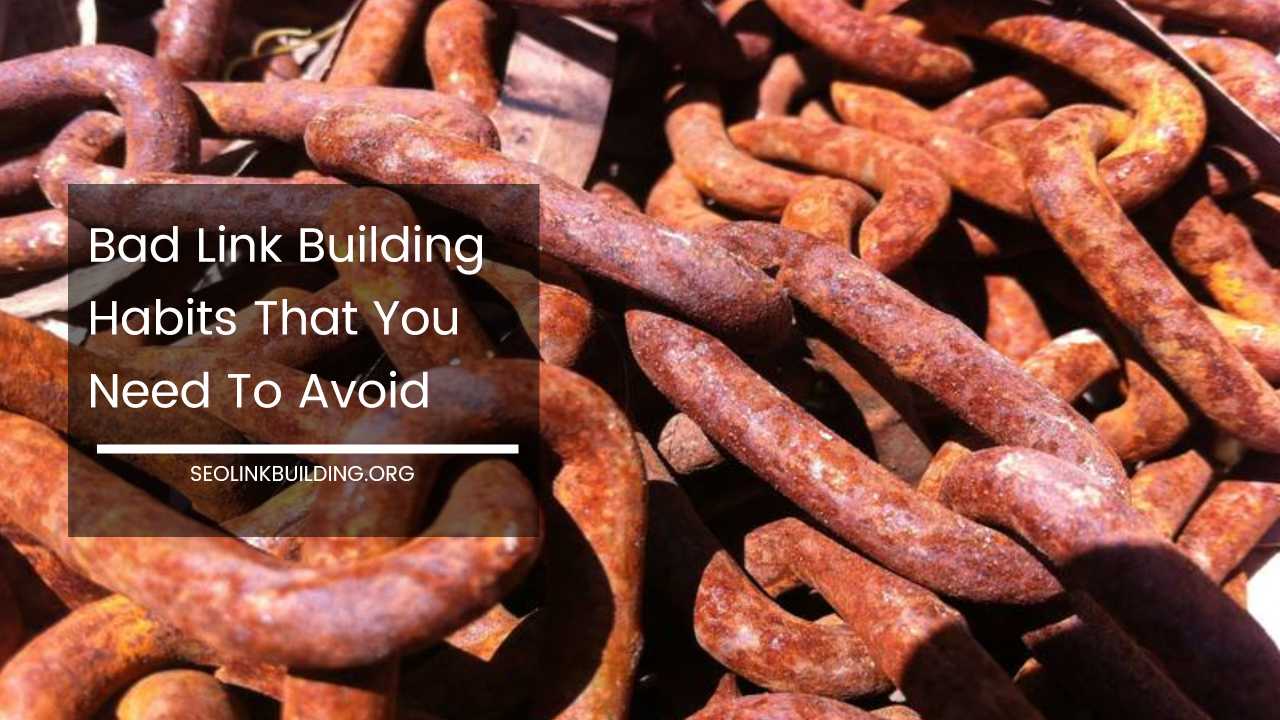Stop Hurting Your Rankings! 10 Bad Link Building Habits to Avoid

Bad Link Building Habits That You Need To Avoid
In the ever-evolving world of SEO, link building remains a fundamental strategy for establishing website authority and achieving higher search engine rankings. However, tactics that were once considered gold standards can now land your website in hot water.
Search engines prioritize user experience and top-notch content, and your link-building approach needs to reflect that.
This article delves into ten detrimental link-building habits you should steer clear of and explores alternative, ethical approaches to cultivating a robust backlink profile.
The Downfall of Outdated Link-Building Tactics:
-
Mass Directory Submissions: While a few high-quality directories still hold some value, the era of submitting your website to hundreds of generic ones is over. These directories are often riddled with spam and irrelevant content, and search engines no longer view them as trustworthy sources. Instead, prioritize building links from relevant, niche-specific directories that cater directly to your target audience.
-
Link Buying and Selling: This tactic is a blatant violation of search engine guidelines and can result in severe penalties, including complete removal from search results. Links should be earned organically through the creation of exceptional content and valuable resources.
-
Guest Posting on Irrelevant Websites: Guest blogging can be a powerful link-building strategy, but only when executed strategically. Posting on websites irrelevant to your niche or with low domain authority offers minimal improvement to your rankings and might even damage your reputation. Partner with websites that share your target audience and provide valuable content for their readers.
-
Automated Link Building Tools: Tools promising quick and easy link building often rely on spammy tactics like automated blog comments and post submissions. Search engines are adept at detecting these practices, and they can significantly harm your website’s standing.
-
Link Stuffing: Unnaturally cramming keywords and backlinks into your content is a sure way to get flagged by search engines. Focus on crafting natural, informative content that provides value to your readers. Backlinks will organically follow when your content is valuable.
-
Low-Quality Article Directories: Similar to mass directory submissions, article directories with low domain authority and irrelevant content do little for your website. Invest your time in creating valuable content that deserves to be linked to, not churning out articles for low-quality directories.
-
Broken Links: Having broken links on your website creates a poor user experience and sends negative signals to search engines. Regularly check your backlinks and internal links for broken ones, and fix them promptly.
-
Link Exchanges: Link exchanges where two websites simply agree to link to each other can appear unnatural to search engines. Instead, focus on creating content so compelling that other websites are naturally drawn to link to it.
-
Private Blog Networks (PBNs): PBNs are networks of websites controlled by a single entity, used solely for the purpose of link building. Search engines actively crack down on PBNs, and getting caught can have serious consequences.
-
Ignoring Negative SEO: While you can’t control what other websites do, be aware of negative SEO tactics where competitors might try to build low-quality links to your website. Regularly monitor your backlink profile using SEO tools and disavow any spammy or malicious links.
Building Backlinks the Right Way: Ethical and Effective Strategies
Now that we’ve explored the pitfalls, let’s delve into some ethical and effective link-building strategies that will help you build a strong backlink profile:
-
Create High-Quality Content: This is the golden rule of link building. Content that is informative, engaging, and addresses user problems naturally attracts backlinks.
- Focus on in-depth content: Aim for long-form content like comprehensive guides, industry reports, or data-driven studies. These types of content establish your website as a trusted source and are more likely to be linked to.
- Target long-tail keywords: Long-tail keywords are more specific and often have lower competition. Content that targets these keywords can attract highly relevant traffic and potentially backlinks from niche websites.
- Optimize for user experience: Ensure your content is well-structured, easy to read, and visually appealing. Users are more likely to engage with and share content that provides a positive user experience.
-
Guest Posting on Relevant Websites: Identify high-authority websites within your niche and craft guest posts that offer valuable insights to their audience.
- Research thoroughly: Before reaching out, thoroughly research the target website’s audience, content style, and editorial guidelines.
- Offer unique value: Don’t just rewrite existing content. Offer fresh perspectives, original data, or insightful analysis that their audience will find valuable.
- Build relationships: Guest posting shouldn’t be a one-time transaction. Build relationships with the website owner and consider future collaborations.
-
Broken Link Building: Find relevant content with broken links that address similar topics as yours. Create a better, updated version of that content on your website. Reach out to the original website owner and suggest your content as a replacement, highlighting how it offers a more valuable resource for their readers. This establishes you as an expert and increases the chances of getting a backlink.
-
Infographics and Visual Content: People are drawn to visuals. Create infographics, charts, or other visual content that is informative and shareable.
- Make it visually appealing: Use high-quality design elements, clear data visualization, and a consistent brand aesthetic to make your infographic visually engaging.
- Promote your infographic: Share your infographic on social media platforms, relevant online communities, and with bloggers in your niche.
- Embed code for easy sharing: Make it easy for others to embed your infographic on their websites by providing a readily available embed code.
-
Build Relationships with Influencers: Connect with industry influencers and bloggers in your niche. Offer them valuable insights or content that they might be interested in sharing with their audience.
- Identify relevant influencers: Look for influencers who create content relevant to your niche and have a strong following.
- Offer genuine value: Don’t just pitch them on your products or services. Offer them valuable content, industry insights, or interview opportunities that resonate with their audience.
- Build long-term relationships: Influencer marketing is about building trust and long-term relationships. Provide value consistently and nurture connections with influencers over time.
-
Become a Source for Journalists: Become a recognized expert in your field. Respond to journalist queries and offer insights for articles, potentially earning backlinks in the process.
- Proactive outreach: Monitor industry publications and identify journalists writing about topics within your expertise.
- Become a reliable source: Respond to journalist inquiries promptly and provide accurate, insightful information.
- Build your media kit: Develop a media kit that showcases your expertise, experience, and previous media mentions. This will make you a more credible source for journalists.
-
Internal Linking: Structure your website with a strong internal linking strategy. Link to relevant internal pages throughout your content to improve user experience and distribute link value.
- Contextual linking: Use anchor text that is relevant to the linked page and naturally fits within the context of the content.
- Link to high-value pages: Link to important pages on your website, such as product pages, service pages, or pillar content.
- Use a silo structure: Organize your website content into topical clusters (silos) and link between related pages within each silo. This helps search engines understand the hierarchy and relevance of your content.
-
Utilize Social Media Promotion: Promote your content strategically on social media platforms. Share valuable blog posts, infographics, and other linkable assets to drive traffic and encourage organic linking.
Final Thoughts:
Link building is an ongoing process that demands patience and a well-defined strategy. By focusing on creating high-quality content, building relationships, and implementing ethical link-building strategies, you can attract valuable backlinks and improve your website’s search engine ranking in a sustainable and organic way.
Remember, quality over quantity is key. Building a strong backlink profile takes time and effort, but the rewards of improved search visibility and organic traffic are well worth it.
Additional Tips:
- Monitor your backlinks: Regularly monitor your backlink profile using SEO tools to identify broken links, spammy links, and potential negative SEO tactics.
- Disavow spammy links: If you find spammy or low-quality links pointing to your website, disavow them using Google Search Console to prevent them from harming your website’s ranking.
- Stay up-to-date: The SEO landscape is constantly evolving. Stay updated on the latest link-building strategies and search engine algorithms to ensure your approach remains effective.
By following these tips and focusing on ethical link-building strategies, you can build a strong backlink profile that will drive organic traffic and improve your website’s search engine ranking for the long term.













